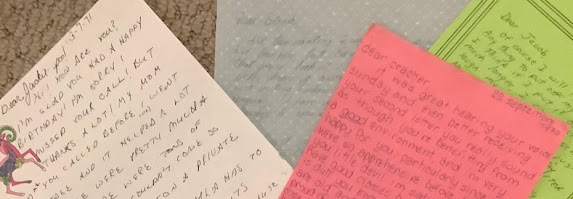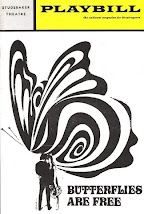 |
| Joanna Chen |
Tuesday, April 16, 2024
Preparing the 2024 Haggadah is not the dilemma I feared
Friday, March 8, 2024
Changing the immigrant narrative: A State of the Union postscript
March 8, 2024
Well into President Biden’s State of the Union address, Biden displayed a pin that referred to Laken Riley, a 22-year-old nursing student at Augusta University who was brutally killed a few weeks ago. Biden’s remarks were off the cuff, not part of the official transcript, and prompted by Georgia Congresswoman Marjorie Taylor Greene, donned in a red MAGA cap, who goaded him from the chamber after buttonholing him as he entered.
Say her name,” Greene heckled. Her stalking worked. Biden took the bait and got hooked.
Typically little is known about the person accused of crimes for weeks after an arrest until the news media researches the hell out of the person’s background. Here too, what was shared by authorities was the accused’s name - Jose Antonio Ibarra. He lived in an apartment near the Augusta campus, he was caught on video, he’s 26, he didn’t know the victim, he’s from Venezuela, he doesn’t have an “extensive criminal history,” he’s not a U.S. citizen, though authorities didn’t know his immigration status. In the initial reports, the incident was likened to a 2023 rape and killing of a 34-year-old woman, who like Riley had been running on campus (at the University of Memphis). The accused suspect was identified, had been charged in Sept. 2021 with raping another woman, and had served 20 years in prison for kidnapping a prominent Memphis attorney in 2000 when he was 16 years old. He was not an immigrant.
 |
| Diego Ibarra A few lines after his exchange with Greene, Biden returned to his script. Referring to Trump only as his predecessor, Biden pledged, "I will not demonize immigrants, saying they are poisoning the blood of our country," referring to Trump’s many anti-immigrant vulgarities, including: “It’s true. They’re destroying the blood of our country,” which he said recently live on Fox News while campaigning in Waterloo, Iowa. |
Biden engaged in a feisty, rehearsed challenge to the Republican side of the aisle to act on what he termed a bipartisan border security approach that collapsed last month after Trump told his congressional minions to kill the deal.
As Republicans started to boo and groan, Biden regained his mojo, “Oh you don’t like that bill, huh? That conservatives got together and said was a good bill? I’ll be darned,” he said and cited the proposal’s supporters, including the Border Patrol union and the Chamber of Commerce. “Unfortunately, politics has derailed this bill so far.”
As all too many polls are showing, immigration matters. It’s become the third rail of politics and it’s derailing anything and anyone who goes near. For the Republicans, they claim Trump means “illegal” immigrants are the blood poisoners. Thanks for clearing that up.
For the Democrats and the left, they cringe at the term “illegal.” Many were vocally critical of Biden for using the term in his speech.
“As a proud immigrant, I’m extremely disappointed to hear President Biden use the word ‘illegal,’”said Cong. Chuy García of Illinois.
Cong. Pramila Jayapal, chairwoman of the Congressional Progressive Caucus, said to an Associated Press reporter that she wished “he hadn’t engaged with Marjorie Taylor Greene and used the word illegal.” Cong. Joaquin Castro, a Texas Democrat, told the Texas Tribune that it was “dangerous rhetoric.”
Cong. Nancy Pelosi, former Speaker of the House, told CNN that Biden “should have said undocumented, but that’s not a big thing.” She added, “We usually say undocumented, he said illegal, I don’t think it’s a big deal.” To others, glaringly big.
Kica Matos, president of the National Immigration Law Center, similarly criticized Biden, saying he “parroted dehumanizing Republican rhetoric about immigrants.”
“We were shocked to hear the president echo the words of anti-immigrant extremists,” the National Immigrant Justice Center said in a statement. “Manipulating a personal tragedy for political gain in this way is dangerous. Conflating immigration status with criminality is racist and dehumanizing.”
That’s the Republican-MAGA narrative on immigration and immigrants. It’s vicious, dangerous, divisive, and Trumped-up. The Laken Riley-Jose Antonio Ibarra saga is their gift that will keep on giving.
It’s often said that in politics, it’s not facts that matter, it’s how the public feels. More on point, it’s how people are told to feel. It’s in the messaging.
The right - from Fox News to MAGA to Trump - have conjured a pet phrase for the duration of the campaign. “Migrant crime.”
An analysis in The Washington Post - The birth of Fox News’s ‘migrant crime’ obsession – captured the phenomenon a week ago. “Over the past month, Fox News hosts, guests and video clips have mentioned ‘migrant crime’ nearly 90 times, more than half of those in the past 10 days,” the story cited. “Trump quickly picked up on the idea. Speaking at a National Rifle Association conference earlier this month, he used the term explicitly. “We call it migrant crime,” he said. “It’s unbelievable what’s going on. And now for the first time, you’re seeing migrant crime. These are tough people.”
“MIGRANT CRIME IS TAKING OVER AMERICA…” Trump said in a video that has attracted more than 20,000 likes on Truth Social. He suggested that Biden had allowed an “invasion of our country,” and “into American communities to prey on our people.” And ultimately full circle to the gift that will keep on giving. He alleged that a “Biden migrant” had committed a murder in Georgia after “Crooked Joe” ordered the immigrant to be released. Cue Marjorie Taylor Greene.
Is there a counter-message? Democrats and the left need to change the immigration narrative. The message and the reality is that the U.S. needs immigrants as workers. I’m naïve, but not so naïve to think it can be deployed during the campaign. Still, it’s to where the national conversation needs to shift. OK, what national conversation? Then call it messaging, talking points, whatever floats your political boat.
For starters, listen to Cong. Delia Ramirez, a progressive Illinois Democrat’s take on Biden’s State of the Union address, She told TIME after the address that she wanted to hear Biden emphasize how immigrants are crucial to the American workforce instead of touting a bipartisan bill that would have added restrictions on immigration. “Democrats, in some cases, we are sounding just like the other side,” she said. “What we heard tonight wasn't very different from what we’ve heard from the other side. And I wish I would have heard him with more conviction say no human being is illegal.”
######
Wednesday, January 31, 2024
A dying Cub fan’s last bequest
By Margie Schaps and Jack Doppelt January 31, 2024
We may be daft, but our bats aren’t in the belfry.
In every crevice lurked wads of dust, webs, droppings, whatever a loose imagination might conjure from years in a garage. Gloves on, I vacuumed everything the nozzle approached. I emptied the garbage bags. I scoured. It looked less like a prop from the Munsters. A few days later, our housekeeper took over and applied skill to elbow grease. Better yet.
 |
| Shower curtain and rubber gloves |
 |
Janet Leigh |
Saturday, January 6, 2024
Letters from home freshman year
January 6, 2024












